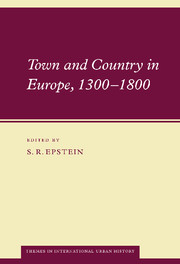Book contents
- Frontmatter
- Contents
- List of figures
- List of tables
- Notes on the contributors
- 1 Introduction. Town and country in Europe, 1300–1800
- 2 Town and country in Sweden, 1450–1650
- 3 Town and country in Holland, 1300–1550
- 4 Town and country in the Dutch Republic, 1550–1800
- 5 Town and country in England, 1300–1570
- 6 Town and country in England, 1570–1750
- 7 Town and country in the Polish Commonwealth, 1350–1650
- 8 Town and country in the Austrian and Czech lands, 1450–1800
- 9 Town and country in Germany, 1350–1600
- 10 Town and country in Switzerland, 1450–1750
- 11 Town and country in France, 1550–1750
- 12 Town and country in Castile, 1400–1650
- 13 Town and country in central and northern Italy, 1400–1800
- 14 Town and country in the kingdom of Naples, 1500–1800
- Index
5 - Town and country in England, 1300–1570
Published online by Cambridge University Press: 09 November 2009
- Frontmatter
- Contents
- List of figures
- List of tables
- Notes on the contributors
- 1 Introduction. Town and country in Europe, 1300–1800
- 2 Town and country in Sweden, 1450–1650
- 3 Town and country in Holland, 1300–1550
- 4 Town and country in the Dutch Republic, 1550–1800
- 5 Town and country in England, 1300–1570
- 6 Town and country in England, 1570–1750
- 7 Town and country in the Polish Commonwealth, 1350–1650
- 8 Town and country in the Austrian and Czech lands, 1450–1800
- 9 Town and country in Germany, 1350–1600
- 10 Town and country in Switzerland, 1450–1750
- 11 Town and country in France, 1550–1750
- 12 Town and country in Castile, 1400–1650
- 13 Town and country in central and northern Italy, 1400–1800
- 14 Town and country in the kingdom of Naples, 1500–1800
- Index
Summary
Urbanisation
By the close of the thirteenth century, the population of England had reached or was close to its medieval peak. Although there is no unanimity as to the precise magnitude, it is widely believed that there were more people in the country c. 1300 than there were to be for some 300 years thereafter and perhaps considerably longer. Until comparatively recently it has been a commonplace to stress the overwhelmingly rural nature of that population and of the economy which sustained it, and the most influential writer on the medieval English economy, M. M. Postan, has stressed the fragile nature of the ecological balance within which it operated, portraying the relation between people and resources in neo-Malthusian terms. New research directions since the 1970s have substantially modified that picture, placing increased emphasis upon the adaptive and innovative character of pre-Black Death England, and upon the degree to which its economy had developed a commercialised character. Parallels are sought with the England of the later sixteenth century, and continuities in the fundamentals of economic and social life receive increasing stress. England's towns c. 1300 were bigger than previously thought, and its agrarian base more varied and responsive to the stimulus provided by concentrated market demand. Consequently, the interrelations of town and country have assumed greater significance and are viewed in a more dynamic light, with greater emphasis placed upon interconnection and mutual stimuli.
- Type
- Chapter
- Information
- Town and Country in Europe, 1300–1800 , pp. 106 - 131Publisher: Cambridge University PressPrint publication year: 2001
- 2
- Cited by



